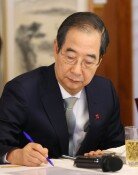Centaurus variant detected in Korea
Centaurus variant detected in Korea
Posted July. 22, 2022 08:05,
Updated July. 22, 2022 08:05

A new case of BA.2.75 (Centaurus), which is a sub-variant of the Omicron strain of COVID-19, has been confirmed, marking the second case since the first case in Korea was detected on July 14.
The Korea Disease Control and Prevention Agency announced that a non-Korean resident in his 30s, who is residing in North Chungcheong Province, was tested positive for COVID-19, and his sample was analyzed to confirm an infection of the BA.2.75 subvariant. The patient came to Korea from India on July 5 and got tested positive for the virus after getting a PCR test on July 7, according to the safety guidelines for individuals entering Korea. The patient received at-home treatment for seven days and has been released from isolation. The health authority said an epidemiological relevance between the patient and the first confirmed case of the BA.2.75 variant has not been verified.
There are four people who were in contact with the patient, and no additional infection has been identified yet. However, since the patient went to workplace before tested positive, more people who have had contact with him might be identified later on. It is reported that the patient had no particular symptom before getting tested for COVID-19.
The patient was tested positive four days earlier than the first confirmed case of the BA.2.75 in Korea, but his infection with the subvariant was found out six days later due to the difference in the way of handling the sample by competent authorities. While the Incheon health authority sent the sample of the first confirmed patient to the KDCA unprecedentedly fast, it took two weeks for the sample to be tested positive for the coronavirus, and then to be tested positive for the infection of the variant. “It took seven days for the competent local government to obtain the patient’s sample and send it to the KDCA, and another seven days were taken for the agency to closely analyze the sample,” said an official at the KDCA. “It typically takes more than two weeks for other countries.”
Experts point out that the speed at which samples are tested for subvariants need to be accelerated, as the more delayed the confirmation of the test results, the higher the risks of additional contagion. “People who enter Korea from India, where the variant of BA.2.75 was first identified, should be tested faster for the infection of the variant,” said Professor Kim Woo-joo of the infectious diseases division at the Korea University Guro Hospital.
ksy@donga.com
Headline News
- Former commander's notebook includes potential plan to incite N. Korean attacks
- Constitutional Court to proceed with impeachment trial on Friday
- Deputy PM confirms next year’s under 2 percent growth projection
- Ukraine says Russia uses fake IDs to hide N. Korean troops
- Pres. Yoon refuses impeachment documents for a week







